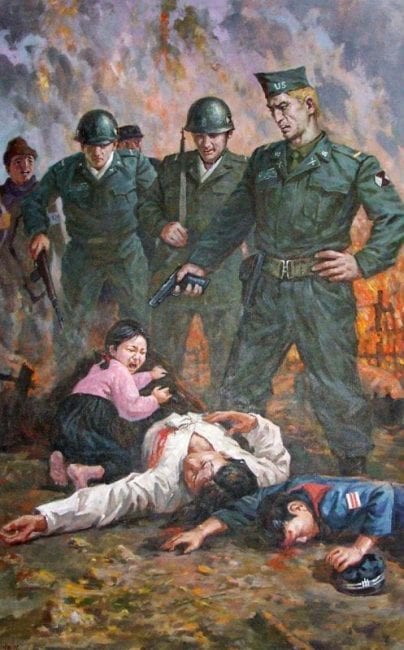For North Americans and the world at large, dealing with North Korea requires understanding, respect and compassion.
stephenlendman.org - Home
Trump threatening “fire and fury like the world has never seen” sounds like the ravings of a lunatic. Possible nuclear war on the Korean peninsula would assure losers, not winners - for sure the DPRK destroyed, much of the country turned to rubble, along with likely millions of casualties, devastating to South Korea as well, a catastrophe vital to avoid. Under international law, no nation may attack another except in self-defense, even then only if authorized by the Security Council - not by heads of state, legislatures or courts.

Few if any Americans understand the feelings of most North Koreans toward the United States, a nation that cowardly butchered their country in the 1950s, which killed 1/3 of their population (as well as millions in the South, too), and has continued to provoke them in the intervening years. How would Americans feel about a nation that murdered via overwhelming war technology the equivalent of 50 million of their compatriots, destroyed their life supports, and flattened all their cities? The American media, not to mention US politicians, do not care to make this historical context clear. Considering how traumatised we are over 9/11, which involved fewer than 3,000 victims, it's obviously impossible for Americans to compute the psychic scars of a people who have lost millions—most of them close relatives.
The UN Charter explains under what conditions use of force by one state against another is justified.
Article 2(3) and Article 33(1) require peaceful settlement of international disputes. Article 2(4) prohibits force or its threatened use.
Article 51 allows the “right of individual or collective self-defense if an armed attack occurs against a Member...until the Security Council has taken measures to maintain international peace and security.”
Justifiable self-defense is permissible. The Security Council has final say.
Charter Articles 2(3), 2(4), and 33 absolutely prohibit any unilateral threat or use of force not specifically allowed under Article 51 or authorized by the Security Council.
Three General Assembly resolutions are seminal, prohibiting “non-consensual” military intervention:
- the 1965 Declaration on the Inadmissibility of Intervention in the Domestic Affairs of States and the Protection of Their Independence and Sovereignty;
- the 1970 Declaration on Principles of International Law Concerning Friendly Relations and Cooperation among States in Accordance with the Charter of the United Nations; and
- the 1974 Definition of Aggression.
Despite international law (and constitutional law under the Supremacy Clause - Article VI, Clause 2), America wages war on one nation after another, clear acts of aggression, the highest of high crimes.
Apocalyptic military aggression is possible if Washington attacks North Korea, threatening the entire region.
Peace and stability depend on strict observance of international, constitutional and US statute laws, prohibiting preemptive attacks on other nations.
None since WW II threatened America, none now, not North Korea or any other country. Preemptively attacking its territory would be clear naked aggression.
A first strike is only permissible in self-defense if facing a virtually certain imminent attack.
No nation threatens America this way, not North Korea or any others, despite bluster by DPRK officials or others elsewhere.
Weapons kill and destroy, not words. No right of self-defense exists against non-imminent threats, no legal justification for current US wars and likely others planned.
Bluster aside, nothing suggests a preemptive DPRK attack on America or any other country. Yet Trump could order a strike on its country anyway, an act of madness if occurs.

II / North Korea Responds to Trump’s Fire and Fury Threat
Heated rhetoric risks something much more serious. The problem lies in Washington, not Pyongyang. Throughout its post-WW II history, the DPRK never attacked another country. In June 1950, it responded to repeated South Korean cross-border provocations. Harry Truman’s devastating war followed - why Pyongyang genuinely fears US aggression now, doing what it thinks best to avoid it, the reason for its nuclear and ballistic missile programs. Without them, it would be defenseless. With them, it’s a regional power to be reckoned with.
Pulling back from reckless brinksmanship on the Korean peninsula is as simple America extending an olive branch, halting provocative area military exercises Pyongyang believes are preparations for war, choosing diplomacy over saber rattling - an alternative approach it rejects.
Trump’s bombast via Twitter and other rhetoric shows profound recklessness, likely along with ignorance about the horrors of aggressive wars, especially if nuclear weapons are used.
Via Twitter he boasted “(m)y first order as President was to renovate and modernize our nuclear arsenal.”
“It is now far stronger and more powerful than ever before…(T)here will never be a time that we are not the most powerful nation in the world.”
“(B)eing unpredictable is a big asset,” he said. “North Korea knew exactly what President Obama was going to do.”
He backs up his bombast with naked aggression in multiple theaters, threatening North Korea and Iran with more, maybe Russia and China to follow.
Pyongyang didn’t ease things by threatening to attack Guam this month - even though 2,131 miles between them likely likely puts the island beyond the reach of the DPRK’s ability to strike it, let alone accurately.
Of greater consequence would be devastating war on its territory in response, turning large parts of the country to rubble, causing millions of casualties, South Korea as well caught in the firestorm, hammered by the DPRK’s military capability until it was destroyed.
Defense Secretary “mad dog” Mattis warned Kim Jong-un of “the end of (his) regime and the destruction of its people” if DPRK threats continue, adding:
He “should take heed of the United Nations Security Council’s unified voice, and statements from governments the world over, who agree the DPRK poses a threat to global security and stability.”
The only Korean peninsula threat comes from Washington, not Pyongyang. Combatively Mattis blustered that “the combined allied militaries now possess the most precise, rehearsed and robust defensive and offensive capabilities on earth” - America perhaps willing to destroy the planet to own it.
DPRK heated rhetoric included the official KCNA news agency quoting General Kim Rak-gyom blasting Trump, saying:
“Sound dialogue is not possible with such a guy bereft of reason and only absolute force can work on him,” adding:
Hwasong-12 ballistic missiles can “be launched (by mid-August to) hit the waters 30 to 40 km away from Guam” - sounding more like a shot across the bow threat than an attempted attack on its territory, which may not be possible anyway.
A separate Pyongyang statement said “(i)f the US fails to act with discretion, persisting in its reckless attempts to stifle the DPRK, we will not waver or hesitate to use any form of ultimate means.”
Heated rhetoric on both sides risks “miscalculation and inadvertent war, particularly if North Korea feels that it must act before an imminent US attack,” according to Professor of Government Jessica Chen Weiss.
“From the standpoint of avoiding war, one hopes that Trump’s improvised threat is correctly interpreted as bluster,” she added.
Given its nonbelligerent history, the DPRK is unlikely to attack America or any other country except in self-defense.
China and Russia continue doing all they can to prevent unthinkable war on the Korean peninsula from erupting.
On Wednesday, Moscow’s UN envoy Vasily Nebenzya stressed the importance of Washington remaining “calm and refrain(ing) from any moves that would provoke another party into actions that might be dangerous” - responding to heated rhetoric on both sides, adding:
“As we said, we want the tensions to ease, and we have to start seriously about devising and inventing ways for a political dialogue on this issue.”
At best, it’ll take a concerted effort by both sides to step back from the brink. The alternative is potentially catastrophic nuclear war, affecting far more than the Korean peninsula if launched.
 STEPHEN LENDMAN was born in 1934 in Boston, MA. In 1956, he received a BA from Harvard University. Two years of US Army service followed, then an MBA from the Wharton School at the University of Pennsylvania in 1960. After working seven years as a marketing research analyst, he joined the Lendman Group family business in 1967. He remained there until retiring at year end 1999. Writing on major world and national issues began in summer 2005. In early 2007, radio hosting followed. Lendman now hosts the Progressive Radio News Hour on the Progressive Radio Network three times weekly. Distinguished guests are featured. Listen live or archived. Major world and national issues are discussed. Lendman is a 2008 Project Censored winner and 2011 Mexican Journalists Club international journalism award recipient.
STEPHEN LENDMAN was born in 1934 in Boston, MA. In 1956, he received a BA from Harvard University. Two years of US Army service followed, then an MBA from the Wharton School at the University of Pennsylvania in 1960. After working seven years as a marketing research analyst, he joined the Lendman Group family business in 1967. He remained there until retiring at year end 1999. Writing on major world and national issues began in summer 2005. In early 2007, radio hosting followed. Lendman now hosts the Progressive Radio News Hour on the Progressive Radio Network three times weekly. Distinguished guests are featured. Listen live or archived. Major world and national issues are discussed. Lendman is a 2008 Project Censored winner and 2011 Mexican Journalists Club international journalism award recipient. 


